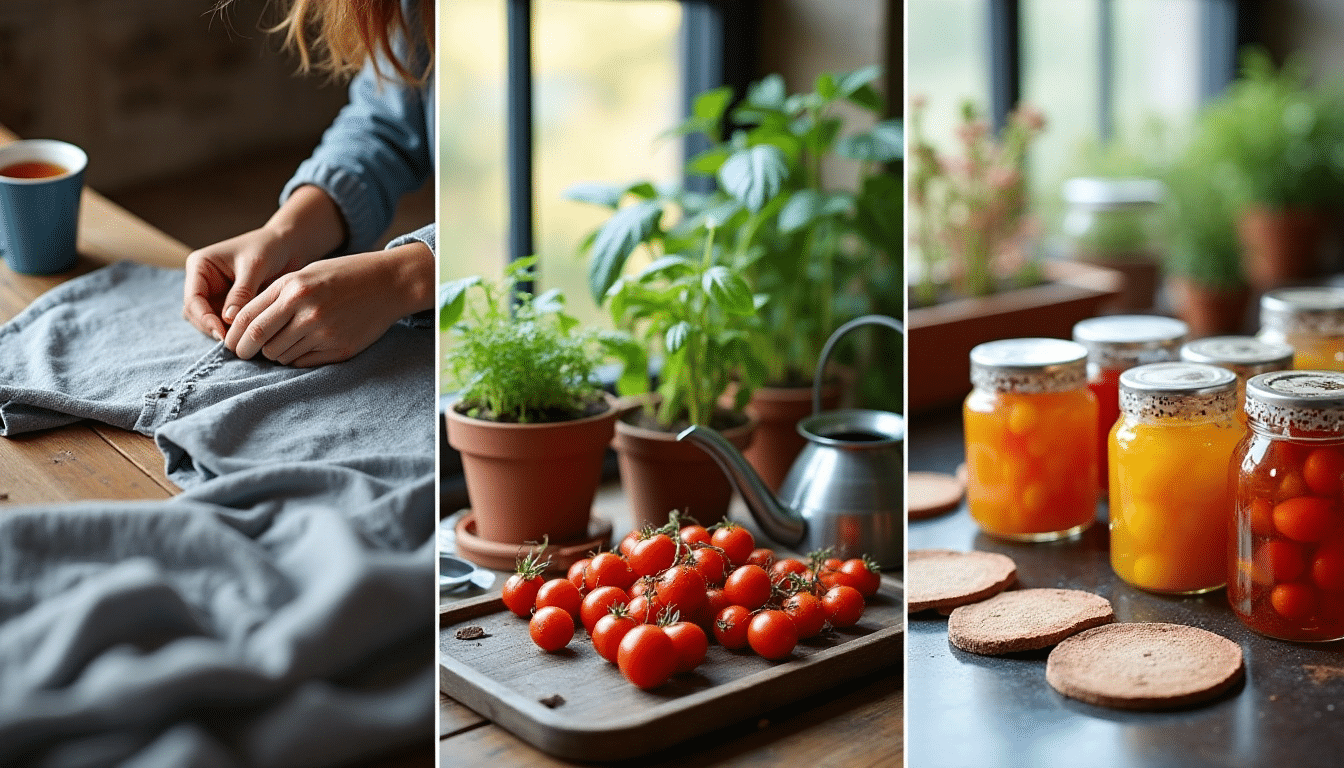I used to think homemaking was outdated; something my grandmother did, but had no place in my modern life. Then I realized I was wrong.
Creating a home isn’t about perfection or following someone else’s rules. It’s about building a space that nurtures your soul and supports your dreams.
Whether you’re a busy professional squeezing in meal prep between meetings or a parent trying to create calm from chaos, these skills matter.
I’ve found that homemaking is a deeply personal experience. Your version might look completely different from mine, and that’s exactly how it should be.
In this guide, I’ll share practical strategies for everything from sustainable daily rhythms to natural cleaning solutions. Most importantly, I’ll show you how to craft a homemaking approach that fits your unique life and values.
Why Homemaking Still Matters in Today’s World?
In our fast-paced digital age, the art of homemaking has never been more relevant. It’s not about returning to the past – it’s about creating intentional spaces that nurture our well-being and reflect our values.
Homemaking is for everyone. Whether you’re a busy professional, a stay-at-home parent, or someone juggling multiple roles, these skills create the foundation for a more peaceful and organized life. The beauty lies in crafting a homemaking mindset that works specifically for your unique situation.
Your home should be your sanctuary, not your source of stress. When you embrace domestic life with intention, you’re not just maintaining a space; you’re creating an environment where you and your loved ones can truly thrive.
Now that we’ve explored why homemaking still matters, let’s talk about how to make it personal, tailored to your lifestyle, your values, and your goals.
Building Your Personal Homemaking Vision

Create a clear roadmap for your ideal home life that reflects your unique values, priorities, and lifestyle goals.
Defining What Home Means to You
Before diving into routines and systems, take a moment to envision what you want your home life to look like. Ask yourself:
- What feelings do you want your home to evoke?
- How do you want to spend your time at home?
- What values are most important to your household?
This vision becomes your guiding north star, influencing every decision, from daily household tasks to major organizational projects. Remember, there’s no one-size-fits-all approach to creating a cozy home.
Welcoming the Expedition with Pride
Homemaking for beginners often starts with comparing yourself to others. Instead, focus on progress over perfection. Every small step toward your vision matters, whether it’s mastering one new recipe or establishing a simple morning routine.
With your personal vision in place, it’s time to bring that vision into daily life through routines that support rather than stress.
Creating Sustainable Daily Rhythms

Establish consistent morning and evening routines that bring stability and flow to your home without overwhelming schedules.
Morning and Evening Anchors
The secret to successful homemaking lies in consistent rhythms rather than rigid schedules. Start with simple morning and evening anchors:
Morning Essentials:
- Make your bed (5 minutes of instant accomplishment)
- Start a load of laundry if needed
- Tidy the kitchen while coffee brews
- Set one intention for the day
Evening Wind-Down:
- Prepare for tomorrow (lay out clothes, prep breakfast)
- Do a 10-minute pickup of common areas
- Review the day with gratitude
These small rituals create stability and help you feel more in control of your environment.
Time Management That Actually Works
Effective time-saving household tips don’t require complex systems. Try these approaches:
| Time Block | Focus Area | Example Tasks |
|---|---|---|
| Morning | Kitchen prep | Breakfast, lunch packing, dinner prep |
| Midday | Maintenance | Quick tidy, one load of laundry |
| Evening | Reset | Dishes, tomorrow’s prep, family time |
The key is consistency, not perfection. Even 15 minutes of focused effort can transform your day.
Mastering Kitchen Confidence

Build cooking skills and meal planning strategies that save time, money, and stress while nourishing your family well.
Cooking from Scratch Made Simple
Cooking from scratch doesn’t mean elaborate meals every night. Start with versatile basics:
- Master 5-7 simple recipes you can make without thinking
- Keep a well-stocked pantry with staples
- Batch cook components (grains, proteins, chopped vegetables)
- Embrace “good enough” meals on busy days
Smart Meal Planning Ideas
Effective meal planning ideas save both time and money:
Weekly Planning Strategy:
- Check your calendar for busy nights
- Plan one new recipe and several familiar ones
- Build meals around seasonal ingredients
- Prep ingredients on less busy days
Grocery Budgeting Tips:
- Shop your pantry first
- Make a list organized by store layout
- Choose one expensive ingredient per week to try
- Buy generic brands for basics
Building Efficient Home Systems

Develop sustainable cleaning routines and natural product solutions that maintain your home with minimal effort and maximum effectiveness.
Cleaning Routines That Stick
Sustainable cleaning routines work with your natural rhythms, not against them:
Daily Tasks (5-10 minutes each):
- Kitchen: Clean as you cook, wipe counters
- Bathroom: Wipe sink after use, quick toilet brush
- Living areas: 10-minute pickup before bed
Weekly Deep Clean:
- Monday: Bathrooms
- Wednesday: Kitchen deep clean
- Friday: Floors and dusting
- Sunday: Laundry catch-up
Natural Cleaning Products Revolution
Creating homemade cleaner recipes is easier and more economical than you might think:
All-Purpose Cleaner:
- 1 cup white vinegar
- 1 cup water
- 10 drops essential oil (lemon or tea tree)
Heavy-Duty Scrub:
- ½ cup baking soda
- ¼ cup liquid castile soap
- 2 tablespoons water
These natural cleaning products are safer for your family and the environment while being incredibly effective.
Smart Organization and Resource Management
Convert cluttered spaces into functional areas while creating systems that help you manage your household efficiently and effectively.
Decluttering Strategies That Work
Effective decluttering strategies start small and build momentum:
- Choose one drawer or shelf to organize completely
- Use the “one in, one out” rule for new purchases
- Create designated homes for frequently used items
- Evaluate items by asking: “Does this serve my current life?”
Organizing the Home Room by Room
Focus on function over aesthetics. Each space should support how you actually live:
Kitchen: Group similar items, keep counters clear, designate prep zones
Bedrooms: Create morning and evening routines, limit furniture to essentials
Living Areas: Balance comfort with tidiness, create storage for daily items
Creating Your Home Management Binder
A home management binder centralizes important information:
- Monthly budget tracker
- Meal planning templates
- Important phone numbers and passwords
- Home maintenance schedules
- Family calendar and activities
Developing Traditional Skills for Modern Life

Learn timeless skills like sewing, gardening, and food preservation that reduce waste, save money, and connect you authentically.
Sewing and Mending Clothes
Basic sewing and mending clothes skills extend the life of your wardrobe significantly. Start with:
- Threading a needle and tying knots
- Replacing buttons
- Hemming pants
- Mending small tears
These skills are both practical and meditative, connecting you to generations of homemakers before you.
Gardening at Home for Beginners image
You don’t need acres to start gardening at home:
Container Garden Essentials:
- Herbs: basil, parsley, mint (easy and useful)
- Vegetables: lettuce, radishes, cherry tomatoes
- Flowers: marigolds, petunias for beauty
Even a sunny windowsill can support a small herb garden that sweetens your cooking and connects you to your food.
Food Preservation Methods
Learning basic food preservation methods reduces waste and saves money:
- Freezing: Blanch vegetables, portion meals, and label everything
- Canning and fermenting: Start with simple jams or pickled vegetables
- Dehydrating: Make fruit leather or dried herbs
Involving Family in Homemaking

Teach children valuable life skills through age-appropriate tasks while creating shared responsibilities that strengthen family bonds and cooperation.
Homemaking with Children image
Homemaking with children teaches valuable life skills while lightening your load:
Age-Appropriate Tasks:
- Ages 3-5: Sorting socks, setting napkins on the table
- Ages 6-8: Loading dishwasher, folding towels
- Ages 9-12: Planning simple meals, doing own laundry
- Teens: Managing their own space, contributing to family meals
Make it fun with music, timers, and celebrating completed tasks together.
Nurturing Your Well-being
Prioritize self-care and mental wellness while building a self-sufficient lifestyle that welcomes slow living and intentional daily practices.
Mental Wellness for Homemakers
Maintaining mental wellness for homemakers requires intentional self-care:
- Schedule time for activities you enjoy
- Connect with other homemakers online or locally
- Practice gratitude for small accomplishments
- Remember that taking breaks makes you more effective
Creating a Self-Sufficient Lifestyle
Building a self-sufficient lifestyle happens gradually:
- Learn one new skill each season
- Reduce reliance on convenience products
- Build relationships with neighbors and the community
- Develop multiple income streams if desired
Welcoming Slow Living Homemaking image
Slow living homemaking prioritizes intention over efficiency:
- Choose quality over quantity in purchases
- Savor daily rituals like morning coffee or evening baths
- Create space for creativity and reflection
- Focus on experiences over possessions
The ultimate goal of homemaking isn’t perfection—it’s creating a space that supports your family’s growth, health, and happiness. Whether you’re mastering budget homemaking techniques or exploring DIY homemaking projects, remember that every small improvement adds up.
Conclusion
Homemaking converts ordinary moments into meaningful memories.
Every skill you develop—from perfecting homemade bread to organizing cluttered spaces—becomes part of your family’s story.
These aren’t just tasks; they’re investments in comfort, connection, and creativity. When you adopt natural cleaning methods or teach children to fold laundry, you’re building traditions that extend far beyond today.
The beauty lies in small victories. A well-planned meal shared around the table. Fresh herbs growing on your windowsill. The satisfaction of mending something instead of replacing it.
Your home reflects your values, nurtures your relationships, and provides sanctuary from the world outside. Trust the process, honor your efforts, and remember that every homemaker’s path is beautifully different.




